新编英语教程第六册(2)
- 格式:ppt
- 大小:1.86 MB
- 文档页数:83


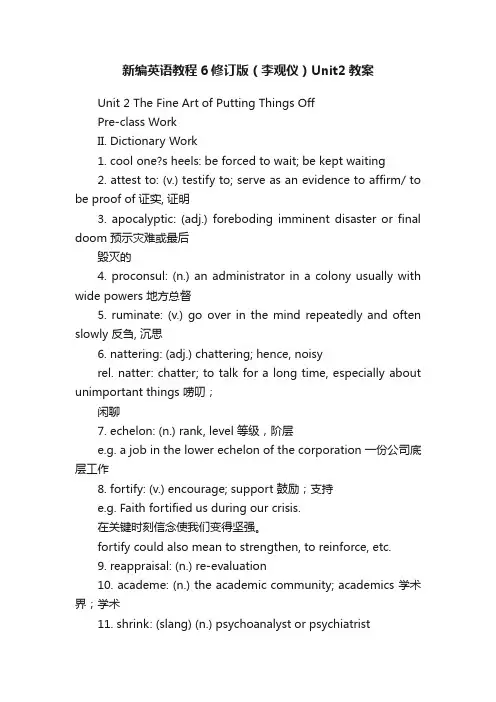
新编英语教程6修订版(李观仪)Unit2教案Unit 2 The Fine Art of Putting Things OffPre-class WorkII. Dictionary Work1. cool one?s heels: be forced to wait; be kept waiting2. attest to: (v.) testify to; serve as an evidence to affirm/ to be proof of 证实, 证明3. apocalyptic: (adj.) foreboding imminent disaster or final doom 预示灾难或最后毁灭的4. proconsul: (n.) an administrator in a colony usually with wide powers 地方总督5. ruminate: (v.) go over in the mind repeatedly and often slowly 反刍, 沉思6. nattering: (adj.) chattering; hence, noisyrel. natter: chatter; to talk for a long time, especially about unimportant things 唠叨;闲聊7. echelon: (n.) rank, level 等级,阶层e.g. a job in the lower echelon of the corporation 一份公司底层工作8. fortify: (v.) encourage; support 鼓励;支持e.g. Faith fortified us during our crisis.在关键时刻信念使我们变得坚强。
fortify could also mean to strengthen, to reinforce, etc.9. reappraisal: (n.) re-evaluation10. academe: (n.) the academic community; academics 学术界;学术11. shrink: (slang) (n.) psychoanalyst or psychiatrist心理分析学者或神经科医生12. subliminal: (adj.) existing or functioning outside the area of consciousawareness 潜意识的13. truism: (n.) an undoubted or self-evident truth 不言而喻的道理;自明之理14. mellow and marinate: (v.) to mellow is to become ripe or fully developed, and the marinate is to steep (浸, 泡) (meat, fish) in a savory sauce to enrich its flavor; here, ripen and mature 成熟及完善III. Library Work1. ChesterfieldPhilip Dormer Stanhope, 4th Earl (伯爵) of Chesterfield , (1694-1773), English statesman, orator and author. His literary reputation rests upon his letters to his illegitimate son (私生子), Philip Stanhope, who was born in Holland in 1732. The letters, filled with wit and worldly wisdom, were published under the title Letters to His Son and Letters to His Godson (1774). Chesterfield's fame as a man of letters rests upon a series of letters, published after his death, that give a faithful account of the manners and customs of aristocratic society in 18th-century England, written in a graceful and witty style.‘M y object is to have you fit to life; which, if you are not, I do not desire that you should live at all.? So wrote Lord Chesterfield in one of the most celebrated and controversial correspondences between a father and his son. Chesterfield wrotealmost daily to his natural son, Philip, from 1737 onwards, providing him with instruction in etiquette and the worldly arts. Praised in their day as a complete manual of education, and despised by Samuel Johnson for teaching …the morals of a whore and the manners of a dancing master?, these letters reflect the political craft of a leading statesman, and the urbane wit of a man who associated with Pope, Addison, and Swift. The letters reveal C hesterfield?s political cynicism and his belief that his country had …always been governed by the only two or three people, out of two or three millions, totally incapable of governing?, as well as his views on good breeding. Not originally intended for publication, this entertaining correspondence illuminates fascinating aspects of eighteenth-century life and manners.2. Samuel Johnson (1709-1784), English writer and lexicographer, a major figure in 18th-century literature as an arbiter of taste, renowned for the force and balance of his prose style.Nicknamed both Dictionary Johnson and the Great Cham of Literature (Cham is an archaic word meaning Khan可汗), Johnson compiled and wrotethe Dictionary of the English Language, published in 1755. He was usually referred to as Dr. Johnson by his contemporaries and later generations.He was equally celebrated for his brilliant and witty conversation. His rather gross appearance and manners were viewed tolerantly, if not with a certain admiration.The son of a bookseller, Johnson excelled at school in spite of illness and poverty. He entered Oxford in 1728 but was forced to leave after a year for lack of funds. He sustained himself as a bookseller and schoolmaster for the next six years, during which he continued his wide reading and published some translations. Johnson settled in London in 1737 and began his literary career in earnest. His poem “London,” published anonymously in1738, was praised by Pope and won Johnson recognition in literary circl es. Johnson?s first work of lasting importance, and the one that permanently established his reputation in his own time, washis Dictionary of the English Language (1755), the first comprehensive lexicographical work on English ever undertaken. Dr. Johnson, as he is universally known, was England?s first full-dress man of letters (学者), and his mind and personality helped to create the traditions that have guided English taste and criticism.StructureSection I (paragraph 1)The theme: Procrastination is not always a non-recommendable practice.Section II (paragraph 2-8)Grounds of argument:Delayers and do-it-nowers (paragraph 2)Delay can inspire and revive a creative soul in many fields (paragraph 3-8)3) in the process of making fictions4) in the field of military, diplomacy and law5) in the higher rank of business6) in decision making7) in universities8) among many people , especially womenSection III (paragraph 9)Conclusion: What you don?t necessarily have to do today, by all means put off till tomorrow.课文译文第二单元推迟的艺术"今天能做的事情决不要推到明天。
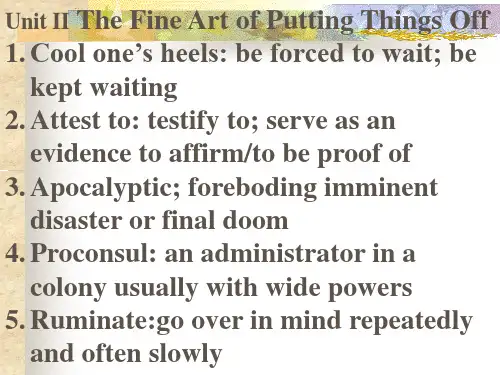

高级英语(二)教与学指南Practice Testsfor Advanced English(2)主编张华鸿前言编写本书的目的:目前英语专业三年级所使用的由上海外国语大学李观仪教授主编的〈新编英语教程〉第五、六册本书的主要特点:1.紧扣精读课文编写练习,实用性、针对性强。
2.对于同义词辨析的练习配以详尽的解释和相应的例句,旨在帮助学生真正弄懂并掌握这些词的用法。
3.设计了旨在提高学生语言运用熟练程度的系列练习,分别为:一、英语释义二、英语句型转换三、汉译英四、完形填空五、成段改错4.练习均配有参考答案。
本书由张华鸿主编。
高华老师负责编写同义词辨析部分;郑艳丽老师负责编写句型转换部分;张华鸿老师负责编写英语释义、汉译英、完形填空和成段改错四部分,以及全书的编排、设计、整合与审编定稿等工作。
本书承华南师范大学外国语言文化学院领导的大力支持,以及英语系高年级教研室全体同仁的热心帮助,编者在此表示衷心的感谢。
编者2003年1月于华南师范大学外文学院ContentsUnit One: VESUVIUS ERUPTS 3 Unit Two: THE FINE ART OF PUTTING THINGS OFF16 Unit Three: WALLS AND BARRIERS28 Unit Four: THE LADY,OR THE TIGER?40 Unit Five: THE LADY,OR THE TIGER?53 Unit Six: DULL WORK65 Unit Seven:BEAUTY 74 Unit Eight: APPETITE84 Unit Nine: A RED LIGHT FOR SCOFFLAWS98 Unit Ten: STRAIGHT-A ILLITERACY114131 Unit Eleven: ON CONSIGNING MANUSCRIPTS TOFLOPPY DISCS AND ARCHIVES TO OBLIVIONUnit Twelve: GRANT AND LEE147 Unit Thirteen: EUPHEMISM163 Unit Fourteen: THAT ASTOUNDING CREATOR---NA TURE175 Unit Fifteen: TEACHING AS MOUNTAINEERING191Unit OneTEXT IVESUVIUS ERUPTSI. Paraphrase the parts underlined in the following:So the letter which you asked me to write on my uncle’s death has made you eager to hear about the terrors and also the hazards I had to face 1when left at Misenum, for I 2broke off at the beginning of this part of my story.I took a bath, dined, and then dozed 3fitfully for a while. For several days past there had been earth 4tremors which were not particularly alarming because they are frequent in Campania: but that night the shocks were so violent that everything fell as if it were not only shaken but overturned.I don’t know whether I sh ould call this courage or 5folly on my part (I was only seventeen at the time) but I 6called for a volume of Livy and went on reading as if I had nothing else to do.Up came a friend of my uncle’s who had just come from Spain to join him. When he saw us sitting there and me actually reading, he scolded us both —me for my 7foolhardiness and my mother for allowing it.By now it was dawn [25 August in the year 79], but the light was still dim and 8faint. The buildings round us were already 9tottering, and the open space we were in was too small for us not to be in real and 10imminent danger if the house collapsed. This finally 11decided us to leave the town. We were followed by a panic- stricken mob of people wanting to act on someone else’s decision 12in preference to their own (a point in which fear looks like 13prudence), who 14hurried us on our way by pressing hard behind in a dense crowd.We also saw the sea sucked away and apparently forced back by the earthquake: at any rate it receded from the shore so that 15quantities of sea creatures were left 16stranded on dry sand. On the landward side a fearful black cloud was 17rent by forked and quivering bursts of flame, and parted to reveal great tongues of fire, like flashes of lightning magnified in size.At t his point my uncle’s friend from Spain 18spoke up still more urgently: “If your brother, if your uncle is still alive, he will want you both to be saved; if he is dead, he would want you to survive him so why put off your escape?”Soon afterwards the cloud sank down to earth and covered the sea; it had already 19blotted out Capri and hidden the promontory of Misenum from sight. Then my mother 20implored, entreated, and commanded me to escape as best I couldI looked round: a dense black cloud was coming up behind us, spreading over the earth like a flood. “Let us leave the road while we can still see,” I said, “or we shall be knocked down and 21trampled underfoot in the dark by the crowd behind.”You could hear the shrieks of women, the 22wailing of infants, and the shouting of men; some were calling their parents, others their children or their wives, trying to recognize them by their voices. People 23bewailed their own fate or that of their relatives, and there were some who 24prayed for death in their terror of dying. Many 25besought the aid of the gods, but still more imagined there were no gods left, and that the universe was plunged into eternal darkness forevermore. There were people, too, who 26added to the real perils byinventing 27fictitious dangers: some reported that part of Misenum had collapsed or another part was on fire, and though their tales were false they found others to believe them. A 28gleam of light returned, but we took this to be a warning of the approaching flames rather than daylight.I could boast that not a groan or cry of fear 29escaped me in these perils, 30had I not derived some poor consolation in my mortal lot from the belief that the whole world was dying with me and I with it.We returned to Misenum where we 31attended to our physical needs as best we could, and then spent an anxious night alternating between hope and fear.II. Rewrite the followingFor each of the sentences below, write a new sentence as close in meaning as possible to the original sentence by using the given words as the beginning.1. We were followed by a panic-stricken mob of people wanting to act on someone else’s decision in preference to their own, who hurried us on our way by pressing hard behind in a dense crowd.Panic-stricken, the mob of people close behind us ___________ _ 2. We replied that we would not think of considering our own safety as long as we were uncertain of his.Unless we were ___________________________________3. There were people, too, who added to the real perils by inventing fictitious dangers: some reported that part of Misenum had collapsed or another part was on fire, and though their tales were false they found others to believe them.By reporting that part of Misenum had collapsed or another part was on fire, _______ 4. I could boast that not a groan or cry of fear escaped me in these perils, had I not derived some poor consolation in my mortal lot from the belief that the whole world was dying with me and I with it.Because I derived some poor consolation_____________________5. Several hysterical individuals made their own and other people’s calamities seem ludicrous in comparison with their frightful predictions.Compared with several individuals’ frightful predictions, the calamities____________ III. Translate the following into English1. 还未等我们坐下来喘息,夜幕已经降临,这黑暗使你觉得不是在无月色或多云的夜晚,而像是在灯火熄灭的紧闭的房间里。
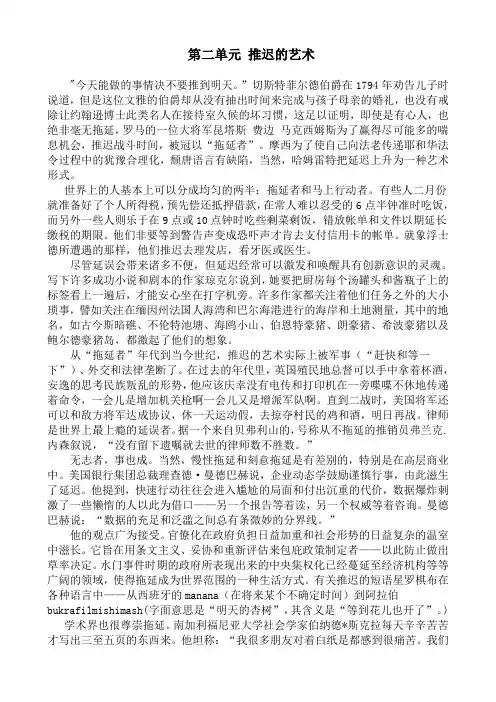
第二单元推迟的艺术"今天能做的事情决不要推到明天。
”切斯特菲尔德伯爵在1794年劝告儿子时说道,但是这位文雅的伯爵却从没有抽出时间来完成与孩子母亲的婚礼,也没有戒除让约翰逊博士此类名人在接待室久候的坏习惯,这足以证明,即使是有心人,也绝非毫无拖延,罗马的一位大将军昆塔斯费边马克西姆斯为了赢得尽可能多的喘息机会,推迟战斗时间,被冠以“拖延者”。
摩西为了使自己向法老传递耶和华法令过程中的犹豫合理化,颓唐语言有缺陷,当然,哈姆雷特把延迟上升为一种艺术形式。
世界上的人基本上可以分成均匀的两半:拖延者和马上行动者。
有些人二月份就准备好了个人所得税,预先偿还抵押借款,在常人难以忍受的6点半钟准时吃饭,而另外一些人则乐于在9点或10点钟时吃些剩菜剩饭,错放帐单和文件以期延长缴税的期限。
他们非要等到警告声变成恐吓声才肯去支付信用卡的帐单。
就象浮士德所遭遇的那样,他们推迟去理发店,看牙医或医生。
尽管延误会带来诸多不便,但延迟经常可以激发和唤醒具有创新意识的灵魂。
写下许多成功小说和剧本的作家琼克尔说到,她要把厨房每个汤罐头和酱瓶子上的标签看上一遍后,才能安心坐在打字机旁。
许多作家都关注着他们任务之外的大小琐事,譬如关注在缅因州法国人海湾和巴尔海港进行的海岸和土地测量,其中的地名,如古今斯暗礁、不伦特池塘、海鸥小山、伯恩特豪猪、朗豪猪、希波豪猪以及鲍尔德豪猪岛,都激起了他们的想象。
从“拖延者”年代到当今世纪,推迟的艺术实际上被军事(“赶快和等一下”)、外交和法律垄断了。
在过去的年代里,英国殖民地总督可以手中拿着杯酒,安逸的思考民族叛乱的形势,他应该庆幸没有电传和打印机在一旁喋喋不休地传递着命令,一会儿是增加机关枪啊一会儿又是增派军队啊。
直到二战时,美国将军还可以和敌方将军达成协议,休一天运动假,去掠夺村民的鸡和酒,明日再战。
律师是世界上最上瘾的延误者。
据一个来自贝弗利山的,号称从不拖延的推销员弗兰克.内森叙说,“没有留下遗嘱就去世的律师数不胜数。
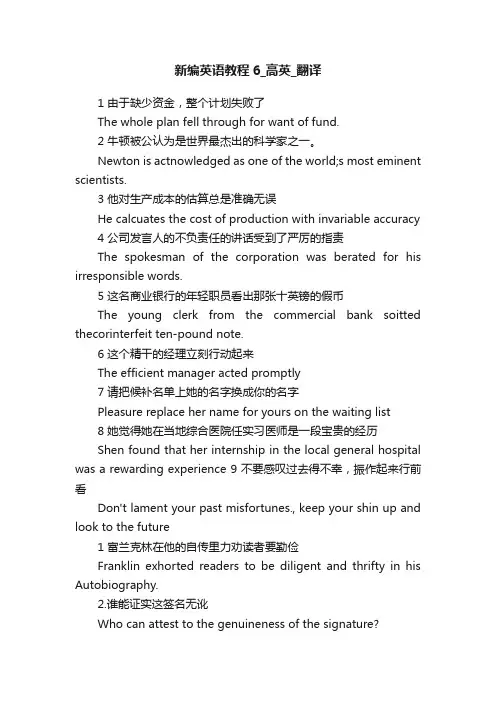
新编英语教程6_高英_翻译1 由于缺少资金,整个计划失败了The whole plan fell through for want of fund.2 牛顿被公认为是世界最杰出的科学家之一。
Newton is actnowledged as one of the world;s most eminent scientists.3 他对生产成本的估算总是准确无误He calcuates the cost of production with invariable accuracy4 公司发言人的不负责任的讲话受到了严厉的指责The spokesman of the corporation was berated for his irresponsible words.5 这名商业银行的年轻职员看出那张十英镑的假币The young clerk from the commercial bank soitted thecorinterfeit ten-pound note.6 这个精干的经理立刻行动起来The efficient manager acted promptly7 请把候补名单上她的名字换成你的名字Pleasure replace her name for yours on the waiting list8 她觉得她在当地综合医院任实习医师是一段宝贵的经历Shen found that her internship in the local general hospital was a rewarding experience 9 不要感叹过去得不幸,振作起来行前看Don't lament your past misfortunes., keep your shin up and look to the future1 富兰克林在他的自传里力劝读者要勤俭Franklin exhorted readers to be diligent and thrifty in his Autobiography.2.谁能证实这签名无讹Who can attest to the genuineness of the signature?3. 人们给它起了小家伙的绰号。

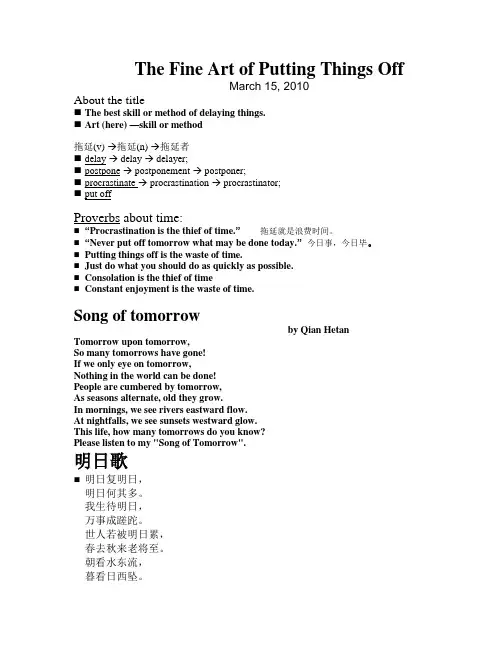
The Fine Art of Putting Things OffMarch 15, 2010About the title⏹The best skill or method of delaying things.⏹Art (here) —skill or method拖延(v) →拖延(n) →拖延者⏹delay → delay → delayer;⏹postpone → postponement → postponer;⏹procrastinate → procrastination → procrastinator;⏹put offProverbs about time:⏹“Procrastination is the thief of time.”拖延就是浪费时间。
⏹“Never put off tomorrow what may be done today.”今日事,今日毕。
⏹Putting things off is the waste of time.⏹Just do what you should do as quickly as possible.⏹Consolation is the thief of time⏹Constant enjoyment is the waste of time.Song of tomorrowby Qian HetanTomorrow upon tomorrow,So many tomorrows have gone!If we only eye on tomorrow,Nothing in the world can be done!People are cumbered by tomorrow,As seasons alternate, old they grow.In mornings, we see rivers eastward flow.At nightfalls, we see sunsets westward glow.This life, how many tomorrows do you know?Please listen to my "Song of Tomorrow".明日歌⏹明日复明日,明日何其多。

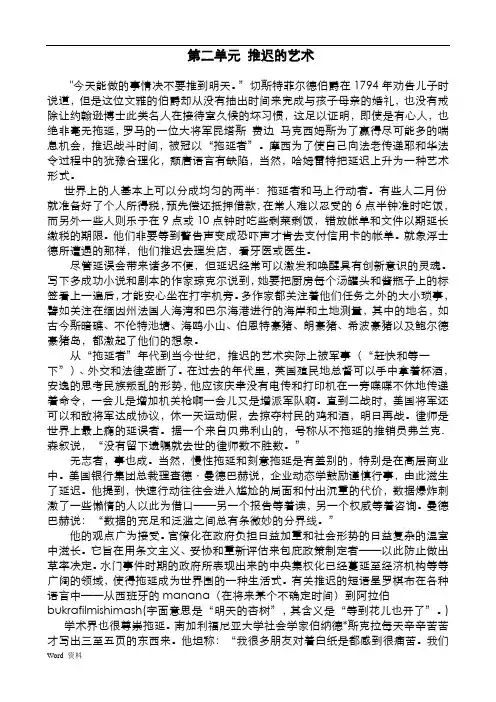
第二单元推迟的艺术"今天能做的事情决不要推到明天。
”切斯特菲尔德伯爵在1794年劝告儿子时说道,但是这位文雅的伯爵却从没有抽出时间来完成与孩子母亲的婚礼,也没有戒除让约翰逊博士此类名人在接待室久候的坏习惯,这足以证明,即使是有心人,也绝非毫无拖延,罗马的一位大将军昆塔斯费边马克西姆斯为了赢得尽可能多的喘息机会,推迟战斗时间,被冠以“拖延者”。
摩西为了使自己向法老传递耶和华法令过程中的犹豫合理化,颓唐语言有缺陷,当然,哈姆雷特把延迟上升为一种艺术形式。
世界上的人基本上可以分成均匀的两半:拖延者和马上行动者。
有些人二月份就准备好了个人所得税,预先偿还抵押借款,在常人难以忍受的6点半钟准时吃饭,而另外一些人则乐于在9点或10点钟时吃些剩菜剩饭,错放帐单和文件以期延长缴税的期限。
他们非要等到警告声变成恐吓声才肯去支付信用卡的帐单。
就象浮士德所遭遇的那样,他们推迟去理发店,看牙医或医生。
尽管延误会带来诸多不便,但延迟经常可以激发和唤醒具有创新意识的灵魂。
写下多成功小说和剧本的作家琼克尔说到,她要把厨房每个汤罐头和酱瓶子上的标签看上一遍后,才能安心坐在打字机旁。
多作家都关注着他们任务之外的大小琐事,譬如关注在缅因州法国人海湾和巴尔海港进行的海岸和土地测量,其中的地名,如古今斯暗礁、不伦特池塘、海鸥小山、伯恩特豪猪、朗豪猪、希波豪猪以及鲍尔德豪猪岛,都激起了他们的想象。
从“拖延者”年代到当今世纪,推迟的艺术实际上被军事(“赶快和等一下”)、外交和法律垄断了。
在过去的年代里,英国殖民地总督可以手中拿着杯酒,安逸的思考民族叛乱的形势,他应该庆幸没有电传和打印机在一旁喋喋不休地传递着命令,一会儿是增加机关枪啊一会儿又是增派军队啊。
直到二战时,美国将军还可以和敌将军达成协议,休一天运动假,去掠夺村民的鸡和酒,明日再战。
律师是世界上最上瘾的延误者。
据一个来自贝弗利山的,号称从不拖延的推销员弗兰克.森叙说,“没有留下遗嘱就去世的律师数不胜数。
Ex. 2A1. SVCWithin the stricken area, not a single soul remained alive, and the city centre looked as if it had been razed by monster steam-roller.2. SVThe bomb exploded 1,000 ft. above the ground.3. SVOOn August 6, 1945, an American aircraft dropped a bomb on the Japanese town of Hiroshima.4. SvoOThree days later, yet another bomb of the same kind gave the town of Nagasaki the same fatal blow.5. SVOCThe explosion made one and a half square miles of the city an expense of reddish rubble.6. SV AWithin the fraction of a second, the bomb changed from a metal cylinder into an immense mass of expanding gas, millions of degrees hot.7. SVOAA tremendous blast of hot air whirled the debris of stone, concrete, metal, and wood over the ground.Ex. 2B1. Walden Pond, once praised by Thoreau for its natural beauty, is now the site of many tourist stands.2. Almost every summer night the cooling northeast wind swept through our bedroom windows, marking air conditioning unnecessary and a light blanket welcome. / Sweeping through our bedroom windows almost every summer night, the cooling northeast wind made…3. The steep surrounding slopes were capped with snow, which fed two streams plunging down to join in the valley below.4. With the river on one side and a large tree providing shade, this is a good spot for a picnic, and we can spread our blanket on the grassy knoll.5. Panting for breath after running up the stairs, Mr wood stood at his neighbour’s door and knocked again and again till someone opened it.6. The town folk envied Horace, who had come into a small fortune with which he bought a big house and obtained a partnership in the biggest grocery in town.7. Standing in front of the mirror, Jim looked at his image, wondering at the big change that had come over him in recent years.8. The idea that his only daughter whom he had greatly wronged might never forgive him almost drove him mad.9. The story, written in plain language, consists of three parts with an interesting plot centering round an aristocratic family living in 17th century France.10. Mud-covered and shivering, John sat hunched over a bowl of hot broth prepared by his father to drive off the chill.11. Far above the waters of a beautiful lake and over the tops of the tall pine trees growing on the steep of a hill stand five Chinese-style pavilions.12. Farther down the street, the old man stopped and leaned against a lamp-post, listening to a cheerful song coming out of a restaurant on the opposite side of the street.13. Sarah sank in the nearest chair, completely exhausted, her limbs stiff with cold, her mind a piece of blank.14. Throughout the day Mrs Rymer behaved very properly, her pleasant, refined face wearing a grave look, her elegant figure wrapped in deep mourning while occasionally she uttered a sigh or a sob.15. Tony thought it necessary to break the news to his family, that Mr Jacob, his former employer, had promised him a half-day job at 20 pounds a week.。
第二单元推迟的艺术”今天能做的事情决不要推到明天。
”切斯特菲尔德伯爵在1794年劝告儿子时说道,但是这位文雅的伯爵却从没有抽出时间来完成与孩子母亲的婚礼,也没有戒除让约翰逊博士此类名人在接待室久候的坏习惯,这足以证明,即使是有心人,也绝非毫无拖延,罗马的一位大将军昆塔斯费边马克西姆斯为了赢得尽可能多的喘息机会,推迟战斗时间,被冠以“拖延者"。
摩西为了使自己向法老传递耶和华法令过程中的犹豫合理化,颓唐语言有缺陷,当然,哈姆雷特把延迟上升为一种艺术形式。
世界上的人基本上可以分成均匀的两半:拖延者和马上行动者。
有些人二月份就准备好了个人所得税,预先偿还抵押借款,在常人难以忍受的6点半钟准时吃饭,而另外一些人则乐于在9点或10点钟时吃些剩菜剩饭,错放帐单和文件以期延长缴税的期限.他们非要等到警告声变成恐吓声才肯去支付信用卡的帐单。
就象浮士德所遭遇的那样,他们推迟去理发店,看牙医或医生。
尽管延误会带来诸多不便,但延迟经常可以激发和唤醒具有创新意识的灵魂。
写下许多成功小说和剧本的作家琼克尔说到,她要把厨房每个汤罐头和酱瓶子上的标签看上一遍后,才能安心坐在打字机旁。
许多作家都关注着他们任务之外的大小琐事,譬如关注在缅因州法国人海湾和巴尔海港进行的海岸和土地测量,其中的地名,如古今斯暗礁、不伦特池塘、海鸥小山、伯恩特豪猪、朗豪猪、希波豪猪以及鲍尔德豪猪岛,都激起了他们的想象。
从“拖延者”年代到当今世纪,推迟的艺术实际上被军事(“赶快和等一下”)、外交和法律垄断了。
在过去的年代里,英国殖民地总督可以手中拿着杯酒,安逸的思考民族叛乱的形势,他应该庆幸没有电传和打印机在一旁喋喋不休地传递着命令,一会儿是增加机关枪啊一会儿又是增派军队啊。
直到二战时,美国将军还可以和敌方将军达成协议,休一天运动假,去掠夺村民的鸡和酒,明日再战.律师是世界上最上瘾的延误者。
据一个来自贝弗利山的,号称从不拖延的推销员弗兰克.内森叙说,“没有留下遗嘱就去世的律师数不胜数。